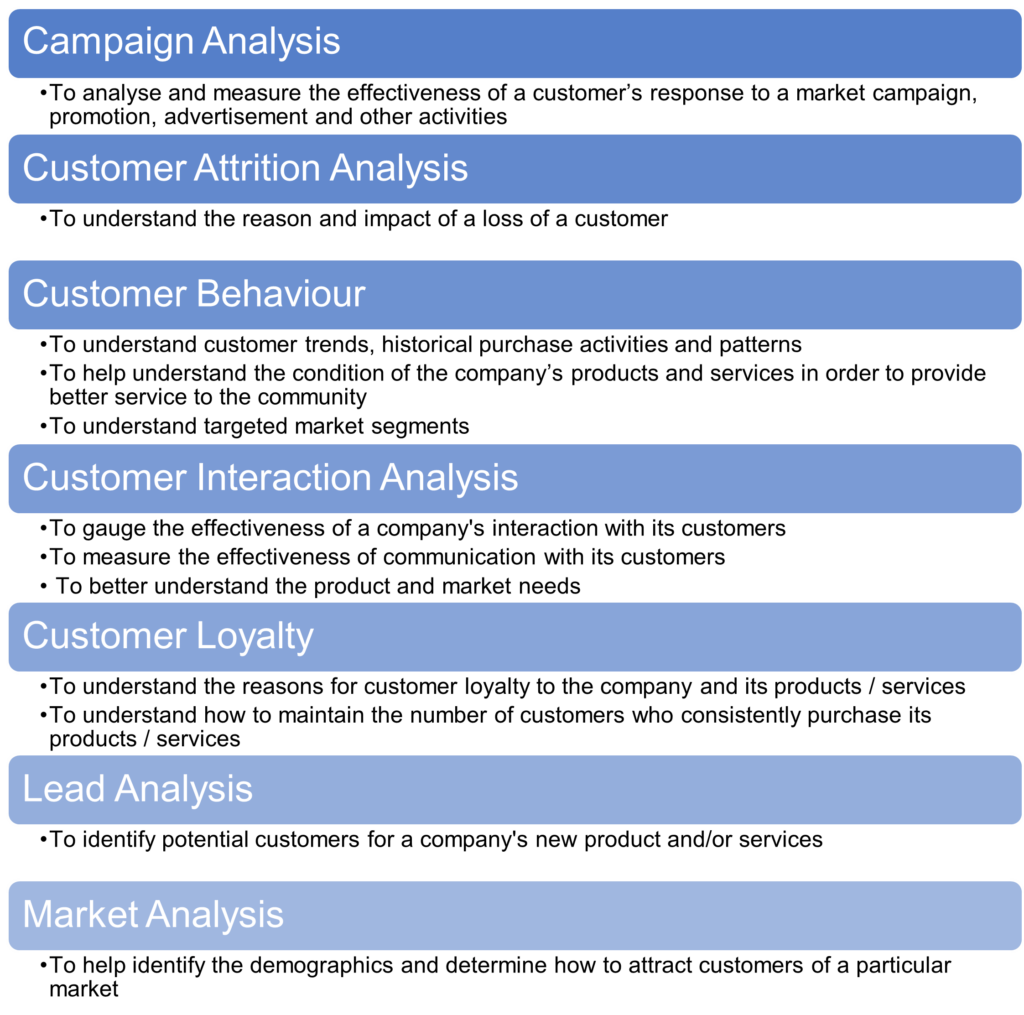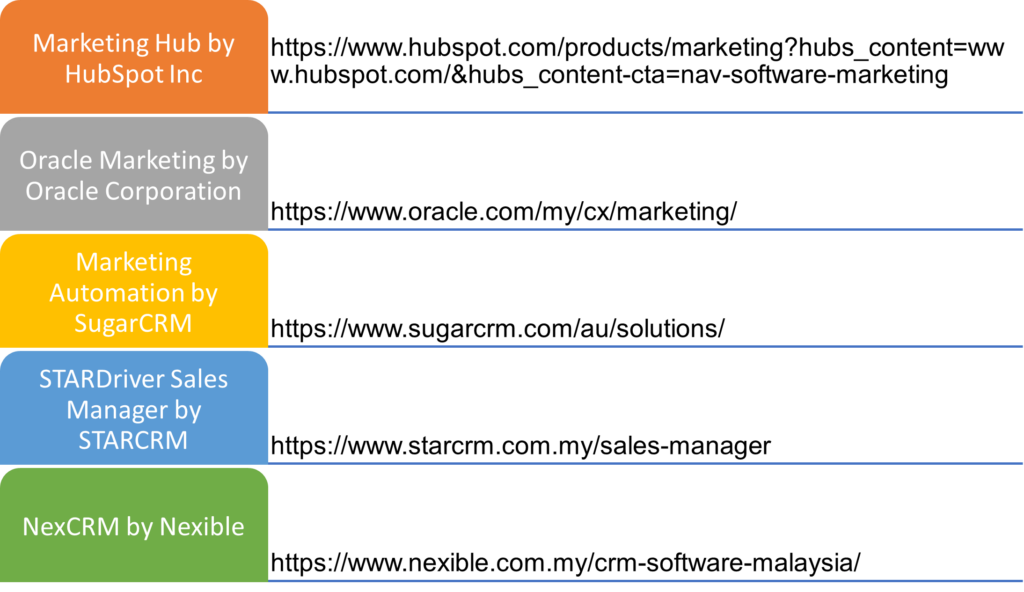About Analytical CRM
Customer Relationship Management (CRM) system is utilised to manage information regarding customer within the range of operational CRM to utilise automation and data management in almost every aspect of customer relation strategies.
This article focuses on Analytical CRM system. Analytical CRM is a subcategory of CRM in which collection of customers’ data regarding their customer interactions and purchasing intent. The aim of Analytical CRM is to increase customer satisfaction and to improve the customer retention rate. The customers are unaware that their actions and interactions with the company are being monitored and analysed constantly. Based on this information, companies can predict trends favoured by their targeted customer segment and can provide customised suggestions tailored towards the customers’ preference.
Background
CRM emerged towards the end of the twentieth century as a marketing tool. According to Trade Reboot (2022), CRM began in the 1980s by Robert and Kate Kestnbaum. They pioneered a marketing database for direct marketing. It analysed the customer database to identify which customers are likely to react positively to a marketing campaign.
In 1986, Pat Sullivan and Mike Muhney created a Conductor Software company and sold their Activity Control Technology (ACT!) Software which was later renamed as Automated Contact Tracking. It was released as the first piece of software designed to manage sales processes and customer engagements from a computer (Leubitz, 2016).
As of today, with the advent of technologies such as big data, Internet of Things, Cloud Computing and smart sensors, the CRM system has evolved to four subcategories, namely Analytical, Operational, Collaborative and Strategic CRM systems.
Analytical CRM is utilised to increase revenue and enhance the relationship with customers. However, many touchpoints between the company and the customers remain unanalysed. Analysing product or service queries may require a huge input of data and expertise for the management. Hence, Analytical CRM may be used to analyse the customer in-depth and disclose essential information based on the customers’ behaviour (Saleem & Siddik, 2020).
Application and Benefits of Analytical CRM
Application
Analytical CRM accumulates and analyses different kinds of customer data for companies to gain a holistic view about their customers, including:

Based on the customer data points (customers’ behaviour and intent), Analytical CRM aggregate these information via data mining and warehousing, operational CRM software and business intelligence for further analysis of insightful customer behaviours and prediction of trends of purchases. Customer data points are beneficial to companies to capture the market interest, by understanding further about customers’ stages of decision-making based on the Sales Funnel Model (Figure 1).

| No. | Type of Customers | Description |
| 1. | The lookers | · Potential customers who browse through products / services · They may conduct research regarding competitors and their products · To them, first impressions matter |
| 2. | The discount-seekers | · Interested in best deals · Buy products / services at a reduced price · Search for discounts before they begin to shop · May be deal-takers |
| 3. | Impulse customers | · Instant decision makers based on emotions · Receptive to recommendations made by others |
| 4. | Need-based customers | · Have specific products / services in mind · Hard to offer upsell to them · May consider a limited option of products / services |
| 5. | New customers | · They go for trials and experiments before forming their opinion about products / services · May enquire further about the products / services · Customer satisfaction may determine their loyalty to companies |
| 6. | Dissatisfied customers | · Frustrated due to unmet customers’ expectations · Do not tolerate negligence or being ignored · May provide feedback for area of improvement |
| 7. | Lapsed customers | · Have not made a purchase within a certain timeframe · Customers will not inform why they stopped buying unless the companies actively enquire about it |
| 8. | Loyal customers | · Repeat orders of products/services · Willing to engage with the company · Have emotional attachment to the products / services / brand · Advocates the preferred company’s products/services |
The Analytical CRM utilise the Lifecycle Marketing Model for Business-to-consumer (B2C) and Business-to-business (B2B) (Figure 2 and 3 below) to provide the insights that are valuable for companies to decide on marketing activities and campaigns to boost their sales and profit generation (Schiffman & Wisenblit, 2019).


In addition, the system acts as a predictive modelling tool. It can aid in computing the variables that affect future successes based on the existing customer knowledge database. Over time, the analysis supports the business decisions that were made based on earlier analysis (Computer Business Research, 2022). Analytical CRM is used for these activities:

Benefits

Trends
The global market for CRM is predicted to grow from RM286.22 billion in 2022 to RM652.92 billion by 2029, at a compound annual growth rate (CAGR) of 12.5 percent during the forecast period. The global CRM market growth had exhibited a decline of 10 percent in 2020 as compared to 2019 (Fortune Business Insights, 2022). The key factor of tremendous growth prediction is due to the fast digital transformation to drive market growth of multiple industries. This relied heavily on CRM systems and various integrated technologies to provide good customer service online and offline. Additional trends in Analytical CRM is as Figure 4 below:

Observation
Companies are encouraged to implement Analytical CRM in order to gain further insights about their market and potential market. This can be beneficial towards the companies and translate to better sales productivity, enhanced customer service, higher customer retention and lower customer acquisition costs.
Examples of Analytical CRM systems that are available in the market that could be adopted by Malaysian SME companies are as follows:

References
Computer Business Research. (2022, March 27). Customer Relationship Management and Business Intelligence. Retrieved February 2, 2023, from Computer Business Research: https://www.computerbusinessresearch.com/Home/customer-relationship-management-and-business-intelligence/analytical-crm/
Fortune Business Insights. (2022, April 3). Customer Relationship Management Market. Retrieved February 2, 2023, from Customer Relationship Management [CRM] Market Growth, 2029: https://www.fortunebusinessinsights.com/customer-relationship-management-crm-market-103418
Kisielewska, M. (2022, December 21). 7 Types of Customers [And How to Satisfy Their Needs]. Retrieved February 21, 2023, from Tidio.com: https://www.tidio.com/types-of-customers/
Leubitz, D. (2016). The Birth of Crm: Two Salesmen and a Restaurant Napkin Drawing. Finance Magnates. Retrieved February 24, 2023 from https://www.financemagnates.com/forex/bloggers/the-birth-of-crm-two-salesmen-and-a-restaurant-napkin-drawing/
Saleem, P., & Siddik, M. (2020). Analytical Customer Relationship Management as an Opportunity for Enhancing Organizational Growth. In (pp. 88-98).
Salesforce.com. (n.d.). The Complete History of Crm Salesforce.com. Retrieved February 27, 2023 from https://www.salesforce.com/in/hub/crm/the-complete-crm-history/
Schiffman, L., & Wisenblit, J. (2019). Consumer Behavior, Global Edition. Pearson Education, Limited.
Oracle Corporation. (2023, January 6). Types of CRM. Retrieved February 8, 2023, from Oracle.com: https://www.oracle.com/my/cx/what-is-crm/types-of-crm/
Vtiger.com. (2021). Analytical Crm. Vtiger.com. Retrieved 26 February 2023 from https://www.vtiger.com/analytical-crm/
